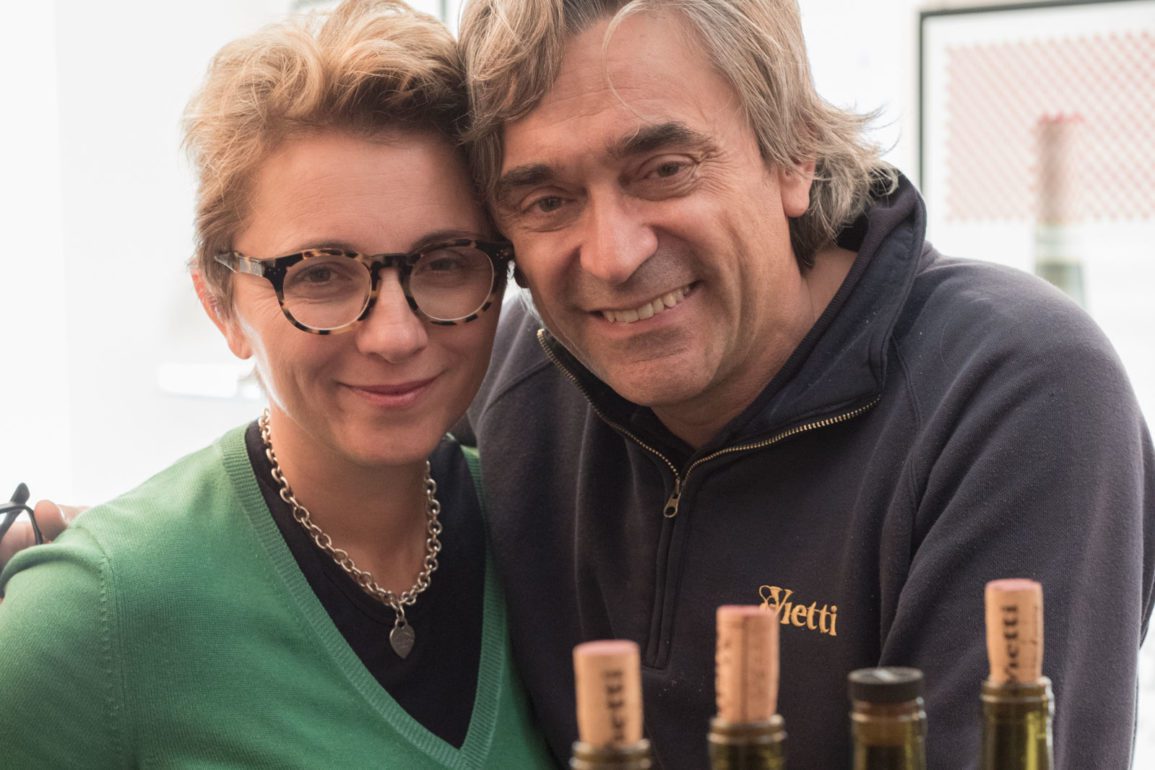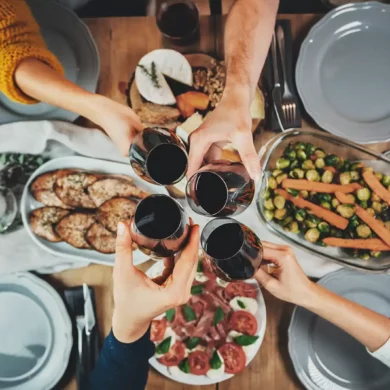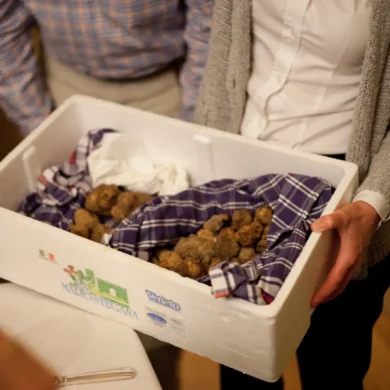Sometimes you need someone a world away to believe in you. A person whose kindness is complemented by vision and a little faith. And even if that person is a stranger, they can transform your life.
Luca Currado and Elena Penna Currado are two such people. Luca is a storyteller, a charmer and a little bit of a rascal. The famous story of how he secretly planted Barbera in his father’s Barolo vineyard — one of the great father-son comeuppance stories I’ve ever heard — never gets old. (It was also never lost on me that his father, Alfredo Currado, was integral to saving Arneis, a grape known locally as “the little rascal”).
Sometimes you need someone a world away to believe in you.
Luca not only proved to his father that Barbera can be epic. He proved he could handle the Nebbiolo, and today, in many circles, he is considered among the greatest winemakers Piedmont has ever seen. Thanks to Luca and his father, Vietti has become an icon in global wine. The artistic labels with their elegant but unpretentious font have always felt like a beckoning invitation to reach for a corkscrew.
Luca’s wife Elena is every bit the ambassador of Barolo as Luca. I’ve seen her in Denver several times, her exuberance palpable from across the ballroom of tasters (and there is always a line at Vietti’s table). Amiable and gracious from the start, Elena’s lightning-fast wit and encyclopedic knowledge of their wines has elevated her to the same stage as Luca — a stage he has gladly shared with all of his heart. “Me, Luca, I dedicated only to you Elena Penna,” he recently wrote on Instagram. “It’s only thanks to you, architect and my only shoulder in the most difficult moments of our lives.”
And now, shockingly, Luca and Elena are moving on from Luca’s family winery.
Vietti has been owned by an American family since 2016: a move they felt was necessary to properly invest in the future of the brand as Barolo land prices skyrocketed. However, they stayed on, kept the ship steady, and even ventured off into exciting new cru vineyards in Barolo and Barbaresco while also launching a gorgeous Timorasso wine. As news broke of their departure this week, it seemed like everyone in the Italian wine universe was struggling to picture Vietti without Luca and Elena. It is like envisioning Star Wars without Han Solo and Princess Leia.

It was the summer of 2015, and my wine blog was barely a blip in the wine world. I wrote about whatever sparked my curiosity, figuring things out as I went along (I’d like to think that, years and thousands of hours of writing and research later, wine is still capable of inspiring that original spirit of humility). On a whim, I decided for my next post, I was going to contact the winemaker and actually interview them, even if English wasn’t their first language, and even if wine writing wasn’t my full-time profession yet. I’d just shared a bottle of Vietti’s Roero Arneis with my wife, Hailey, and was intrigued with its story of salvation. I reached out to Vietti through their website.
It was August, mind you. Italians, especially Italian winemakers, take a deserved vacation in August. Yet Luca — one of Italy’s most famous winemakers, unbeknownst to me at the time — responded with gusto. Suddenly, I had a real story, and I was on another trajectory as a writer. I was the last to realize that my perspective on wine was not anywhere as interesting as the producer’s. I needed to do this again. And again. And again.
A year later, Vietti’s importer brought five winemakers to Denver and invited me. Elena was in attendance, and when I introduced myself, she excitedly texted Luca (back in Barolo) that we were together. “We need a picture of us for Luca,” she said.
I’ve long suffered from imposter syndrome, especially in the wine world. My dear friend Jeremy Parzen will tell you as such. I honestly felt like a nobody walking into that room, yet Elena made me feel like a somebody. So I kept going. And recognition for my work soon followed.
Finally, in 2017 while traveling in Italy with Hailey, we visited Vietti and I met Luca in person. He was bright-eyed and welcoming, but had some business to attend to. So Elena spent the entire morning with us, answering any question I could conjure. Then Luca reappeared and artfully presented his single-vineyard Barolo wines to us in their small tasting room, a maestro pouring his vibrantly aromatic and detailed wines with all the charm he is know for.
For lunch, we drove down to the lower winery below Castiglione Falleto to enjoy a potluck of Macedonian and Croatian food prepared by his crew. It was clear to both of us how closely knit the whole company was at the time. We felt like Anthony Bourdain in one of his many convivial banquet scenes from Parts Unknown. Inspired, I decided to write about that specific experience and spotlight the Vietti crew, something Luca told me later was more meaningful to him than any article about his wines could be.
There would be other meetups as they passed through Denver — a great market for Italian wine — as well as frequent email and Zoom exchanges, too. Last year, when I needed a video to explain in one of my classes the difference between young Barolo and aged Barolo, Luca and Elena were game to shoot a video on their phone and send it to me.
“To drink a younger Barolo, is like to drive a sports car,” Luca says in his rich, lyrical accent. “You feel all the energy, the horsepower, but you feel also every bump on the road. Older Barolo is like driving a luxury limousine: very comfortable, very sweet and you don’t feel anything on the road.”

Wine professionals in America often get hung-up on the legacy of family wineries in Europe. It’s understandable when you come across a business with centuries of succession: we just don’t have much of that here in the States. Furthermore, a legacy — a true familial legacy — is a rather rare thing in any part of this modern world. It’s magical to be allowed a taste of it.
But this obsession can also veer into dangerous territory.
The stress of running a family business is extraordinary, let alone one that is a winery. But how would you like to uphold your grandfather’s reputation while frost and hail decimate your crop, or searing heat waves threaten to nudge your wine into unrecognizable alcohol levels? How would you like to wake up to news of arbitrary tariffs on your product from a foreign market you’ve faithfully cultivated? Or a novel virus that threatens your close-knit team of employees in the winery? Or glass shortages that prompt a scramble just to package your product?
The subtext in some cases seemed to be “how could they?” A better question is “how would you?”
And how would you like the pressure of upholding the past of your ancestors’ product when such a product might be an impossibility for your children because of climate change?
I am not speaking for Luca and Elena specifically here, but rather an amalgamation of the stressors I’ve learned about from a lot of different winemakers. The profession is a grind as it is, but when the work is this personal — this tied to your heritage and even your very own bloodline — how can you even breathe? I cannot imagine, and so I cannot judge. I should not judge. None of us should.
Some were critical of the Currado’s when they sold Vietti to the Krauss family, just as some were flabbergasted when Biondi-Santi sold to the French firm EPI the same year. The subtext in some cases seemed to be how could they?
A better question is how would you? How would you deal with that job? That pressure? That familial commitment? That desire to live a balanced life and maybe, just maybe, say “fuck it” on a random Tuesday and go to the beach as you’ve always wanted?
I haven’t corresponded with Luca and Elena since this news broke. It doesn’t feel like its my place. I am sure it was an agonizing decision, and they deserve time and space to wrap things up as they see fit. They’re also not going far, from what it sounds like. Elena has her spirits brand to continue, and Luca will continue to consult as an enologist at select estates. This is not the last we’ve heard from Luca and Elena. It’s just the last we’ve heard from Luca and Elena and Vietti. At least for now.
I wish them well, and thank them. To this writer in Colorado, their faith in a complete stranger is every bit as magical as a sip of their Lazzarito Barolo.



